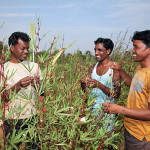Welthungerhilfe India, Nepal, Bangladesh
Key Facts
13 in 100
in the age group of 18-29 years are unemployed, according to a government survey.10 million
youth enter the Indian job market every year.Of the 430 million youth in India, 86% drop out of school after 15 and only 2% can access formal training. According to a government survey, 13 in 100 in the 18-29 age group are unemployed. With 10 million youth entering the job market every year, the country faces a huge challenge of creating employment for them. The challenge is bigger in rural areas, where nearly 70% of the population live and depend primarily on small holder agriculture. It is of utmost importance, on one side, to fill in the skill gaps of the unorganised sector in India – on the other hand, to create value chain and appropriate market system for small holder products.
Our work
The Green College initiative has been developed for skill development on green trades such as sustainable farming, animal husbandry, veterinary paraprofessionals, integrated fishery, sustainable harvesting and processing of forest produce and solar lighting. The training courses combine the traditional wisdom of these communities with modern scientific knowledge to help the small producers grow into `ecopreneurs’ by having better access to business development skills, entrepreneurial skills and technology, thus ensuring higher income and bringing back pride and dignity to these rural professions. The skill development programme for rural youth was successful in raising their income level by creating better access to technology, finances and market. Currently, Welthungerhilfe supports 13 Green Colleges and Skill Green Global – an institute which supports Green Colleges and similar initiative.
Developing ecopreneurs is supported by a complementary initiative ‘Bhoomi Ka’ which develops and strengthens sustainable value chains for ‘clean, green and fair’ foods. Developed under the brand name – ‘Bhoomi Ka’ it helps to build markets for smallholder farmers and helps bridge the rural-urban divide in promoting local food systems. It brings together ecopreneurs, consumers, smallholder farmers and their producer organisations, certification bodies and civil society networks. Bhoomi Ka is spread across six states – eight cities, 5000 farmers, 40 retail outlets reaching out to 500000 consumers.
Initiatives
-

Green Colleges
The ‘Green Colleges’ train rural youth in green trades, combining traditional wisdom with scientific techniques to help them become ‘ecopreneurs’ and to enable them have better access to technology, finances and market.
Economic Development
-

Bhoomi Ka
Bhoomi Ka is a network of smallholder farmers, ecopreneurs, producer organisations, certification bodies and consumers promoting local food systems.
Economic Development



